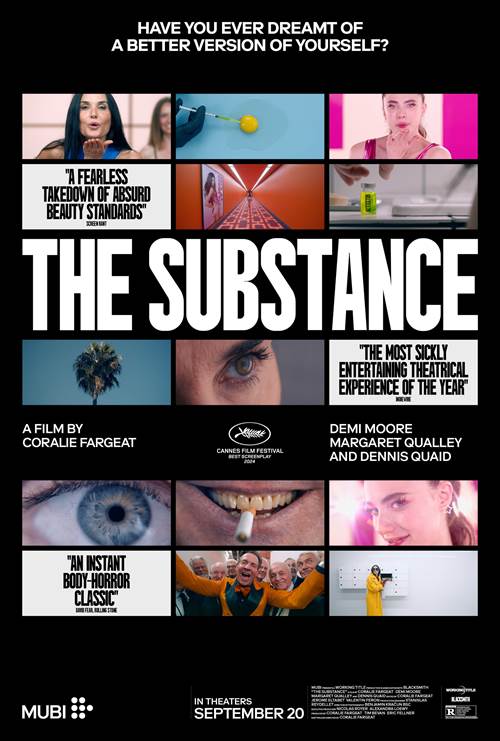Society dictates that beauty equates to success, but what happens when youth fades? The Substance (2024), directed by Coralie Fargeat, offers a disturbing critique of the beauty standards imposed on women. The film follows Elisabeth Sparkle, portrayed by Demi Moore, a 50-year-old actress who, after losing her job, turns to an experimental drug that restores her youth in the form of a younger version of herself, named Sue (Margaret Qualley). What begins as an attempt to revive her career and reclaim her power—lost due to the natural aging process—soon turns into a terrifying reflection on the nature of freedom.
At the heart of The Substance is a deep philosophical exploration of freedom. The film raises a central question: How free are we to define who we are when society imposes rigid expectations? By taking “The Substance,” Elisabeth seems to exercise her autonomy, reclaiming something she feels society has taken from her—her youth, and with it, her worth. In a culture that equates personal value with conventional attractiveness, Elisabeth’s decision appears to be an act of self-empowerment.
However, the film quickly reveals this freedom as an illusion, a trap disguised as choice. Elisabeth’s youthful transformation ties her even more deeply to the superficial values that have oppressed her throughout her life. Through grotesque body horror, the film portrays her internal suffering as her body mutates into a grotesque form, symbolizing the loss of control over her identity. Her body, once an ally, becomes a battleground—distorting her identity in a futile struggle to escape time. The physical transformations serve as a metaphor for the psychological violence inflicted by societal expectations, creating a powerful dissonance between how she feels and what her body represents.
One of the key questions raised by The Substance is the role society plays in shaping our understanding of freedom. In libertarian philosophy, individual liberty is paramount, and any form of coercion, particularly by the state, is viewed as an infringement on personal autonomy. However, the film suggests that societal norms and values can be just as coercive as any government regulation. While Elisabeth appears to be exercising her personal freedom by taking The Substance, her decision is dictated by the societal pressures she faces—pressures that value beauty and youth above all else.
This dynamic challenges libertarian ideals, questioning whether true autonomy can exist in a world dominated by societal pressures. The film critiques the illusion of free will, suggesting that what we perceive as choices are often shaped by external forces beyond our control. The character of Elisabeth raises essential questions: Is beauty a form of power or a prison? How far will we go to sacrifice our essence in the pursuit of an idealized version of ourselves? In The Substance, the price of self-improvement is high—the loss of identity, humanity, and, ultimately, control over one’s self.
Fargeat paints a visceral picture of a society consumed by toxic beauty standards. Her use of symbolism and visual distortion pulls the audience into a world where physical appearance masks one’s true identity. Through the exaggerated makeup and grotesque special effects that depict Elisabeth’s transformation, Fargeat emphasizes the violence society inflicts on the female body. Every wrinkle that disappears, every curve that is artificially enhanced, becomes a wound that exposes the fragility of identity and the impossibility of escaping these oppressive standards.
The fight for freedom, The Substance argues, involves rejecting the traps of conformity and embracing our identity as it is—free from the dictates of the market or culture. True freedom can only be found by resisting societal pressures that seek to define our worth. As the film suggests, beauty should not be an end in itself but a manifestation of one’s authentic self, without sacrificing personal essence in the process.
Through this lens, The Substance offers a sharp critique of libertarian ideals, showing that even in a society free from state intervention, external societal pressures can exert a form of soft coercion that undermines personal freedom. In a world shaped by imposed ideals, the very pursuit of liberty may be a Sisyphean task, with individuals constantly fighting to escape one set of chains only to be bound by another.
The Substance challenges us to rethink our understanding of freedom. The film forces us to ask whether true autonomy is even possible in a world governed by societal norms that shape our choices. Elisabeth’s transformation into Sue serves as a stark reminder that the quest for liberation can sometimes lead us deeper into the prisons we sought to escape. To truly experience freedom, the film suggests, we must reject not only external control but the internalized standards that limit our autonomy. Only then can we hope to find an authentic expression of self—free from the pressures of conformity.
This piece solely expresses the opinion of the author and not necessarily the organisation as a whole. Students For Liberty is committed to facilitating a broad dialogue for liberty, representing a variety of opinions. If you’re interested in presenting your perspective on this blog, click here to send us your own piece submission!
